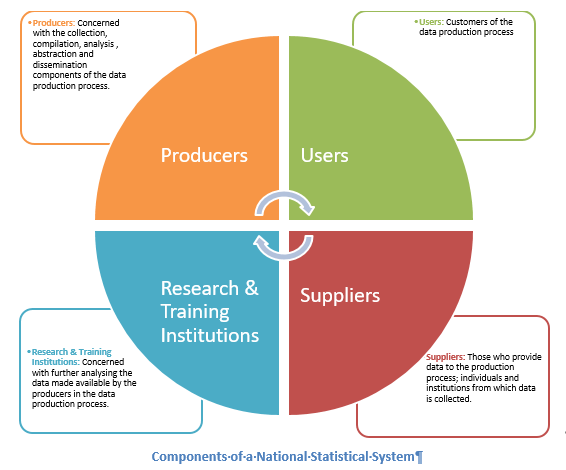

FAQs
FAQs
Frequently Asked Questions
Data is a collection of facts, such as numbers, words, measurements, observations or just descriptions of things. In a more technical sense, data are a set of values of qualitative or quantitative variables about one or more persons or objects, while a datum (singular of data) is a single value of a single variable.
The science concerned with the development and application of methods for collecting, organizing, presenting, analyzing and interpreting numerical data in large quantities, especially for the purpose of inferring proportions in a whole from those in a representative sample.
Facts or pieces of data obtained from a study of a large quantity of numerical data. Statistics can be used to present facts in various formats and facilitate comparisons.
Statistics provide empirical data for use in decision making, programme development and provide guidance in policy formulation. Statistical methods are helpful in formulating, testing hypothesis and developing new theories.
Administrative data is statistical data collected, processed, stored and disseminated from one or more administrative sources. It is data usually collected during the course of conducting business. The equivalent of a survey but with the source of data being administrative records rather than direct contact with respondents.
A census is a survey that aims to count the entire population of the units under examination.
A population and housing census of a country, is the total process of collecting, classifying evaluating, analyzing and. publishing or distribution of demographic, economic and social data of the population during a certain period of time and at the location where each person usually lives.
An agricultural census is a statistical survey used to establish data on agricultural production and to examine the processes and occurrences taking place in agriculture. Agricultural censuses may cover all components including farming, livestock and horticulture and fishing.
Censuses are conducted according to uniform, standard international methodologies.
International standards recommend that a Population and Housing Census is conducted every ten (10) years.
ASD stands for the Anguilla Statistics Department.
The ASDs office hours are from 08:00 – 16:00hrs. Lunch is taken between 12:00 – 13:00hrs
The ASD’s mandate according to the Statistics Act 2004 is;
The ASD collects and publishes data in three (3) domains;
The latest statistics are published to this website at www.gov.ai/statistics
Data are organized on the site using the thematic classifications of Statistics.
The ASD is the coordinator of the National Statistical System within Anguilla which seeks to jointly coordinate the collection, compilation, analysis, abstraction and dissemination of official statistics. A diverse cross-section of stakeholders are responsible for various aspects of the data production.
The ‘original’ NSS comprises of data producers, users and suppliers of data or information. However, recently the view has been expressed that research and training institutions should be included as part of the NSS.

The ASD has a survey calendar, which outlines what surveys are to be completed and the frequency with which they are to be conducted. The Annual Business Survey, which includes the National Accounts, Balance of Payments and International Investment Position are conducted annually.
Other surveys are conducted with more and less periodicity.
No, however surveys conducted by the ASD are done so under the Anguilla Statistics Act.
Our surveys are announced in the press and the public will be informed that the ASD is conducting the survey.
Interviewers working for the ASD will be wearing ASD photo identification badges – check the certificate signature at the back. Our interviewers wear vest or other clothing with an ASD mark.
Our interviewers will never ask for your bank or credit card details or money.
No payment is made for completing the ASD surveys. The data is needed to produce vital and unbiased information for Anguilla. It's collected to benefit the country.
Ministries, department, companies or individuals may acquire the services by contacting the ASD on 1264-497-5731 or emailing statistics@gov.ai
• The figures collected from these questionnaires are used to compiled Anguilla’s National Accounts and Balance of payments and International Investment Position. This set of economic indicators used by the ECCB to set monetary policy for this region, assist potential and existing investors, like yourself, in their business decision– making and by Government in designing economic and fiscal policies and programmes.
The prices collected are used to calculate the Consumer Price Index (CPI), which is a measure of the average changes in prices over time of goods and services purchased by householders.
We collect information to analyse and produce statistics about Anguilla. The statistics provide information on thematic areas such as climate, households, consumer spending among other areas.
You and/or your household are selected based on scientific sampling.
When you complete one of our surveys, or the Anguilla Population and Housing Census, you’re contributing to information you can use to find out more about Anguilla and your community (district). We produce information about topics relevant to families – such as the employment situation in our country, household sizes, how much households spend, – and information you can use to benefit your business or use in your research. This information is available from our website for everyone to use or contact us.
The data collected when you answer the survey/census questionnaire is used to produce statistics and research needed to inform decision-making by Anguillians, businesses and government.
The statistics we produce are all available free of charge from our website.
Yes. Your privacy is important to us. We are committed to keeping your information completely secure and confidential. Our published statistics and research do not identify individuals, households, or businesses.
Revised statutes of Anguilla, Chapter S60, Statistics Act - this Act governs the collection, compilation and dissemination of statistics by the Anguilla Statistics Department in Anguilla along with principles and guidelines to ensuring the confidentiality of the data.
The Act was last updated in 2004;
http://www.gov.ai/statistics/images/StatisticsAct151200.pdf
No. Your individual data is not shared. When we share information it is in a format that persons are not able to identify individuals; natural or person. No other ministry or department can get information that identifies survey respondent; individuals or businesses.
Every person from whom particulars may lawfully be required pursuant to this Act or any regulation shall, to the best of his knowledge, when required to do so. This maybe done by filling up and supplying, in accordance with the instructions contained in or accompanying or having reference to any schedule, form or other document, the particulars specified in that schedule, form or other document, as is prescribed.
A census involves counting or asking questions on an entire population (people, households, animals, etc.)
No. The data the Anguilla Statistics Department collects is needed to produce vital information for Anguillians. It benefits everyone.
In most cases you’ll be able to tell whether some is from the Anguilla Statistics Department by their actions and what there are wearing. The following guidelines will help you identify Anguilla Statistics Department’s enumerators, interviewers or supervisors.
If you’re not sure, contact us
Past press releases could be obtained from the website; www.gov.ai/statistics
X
X
X